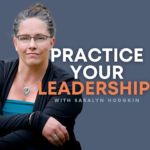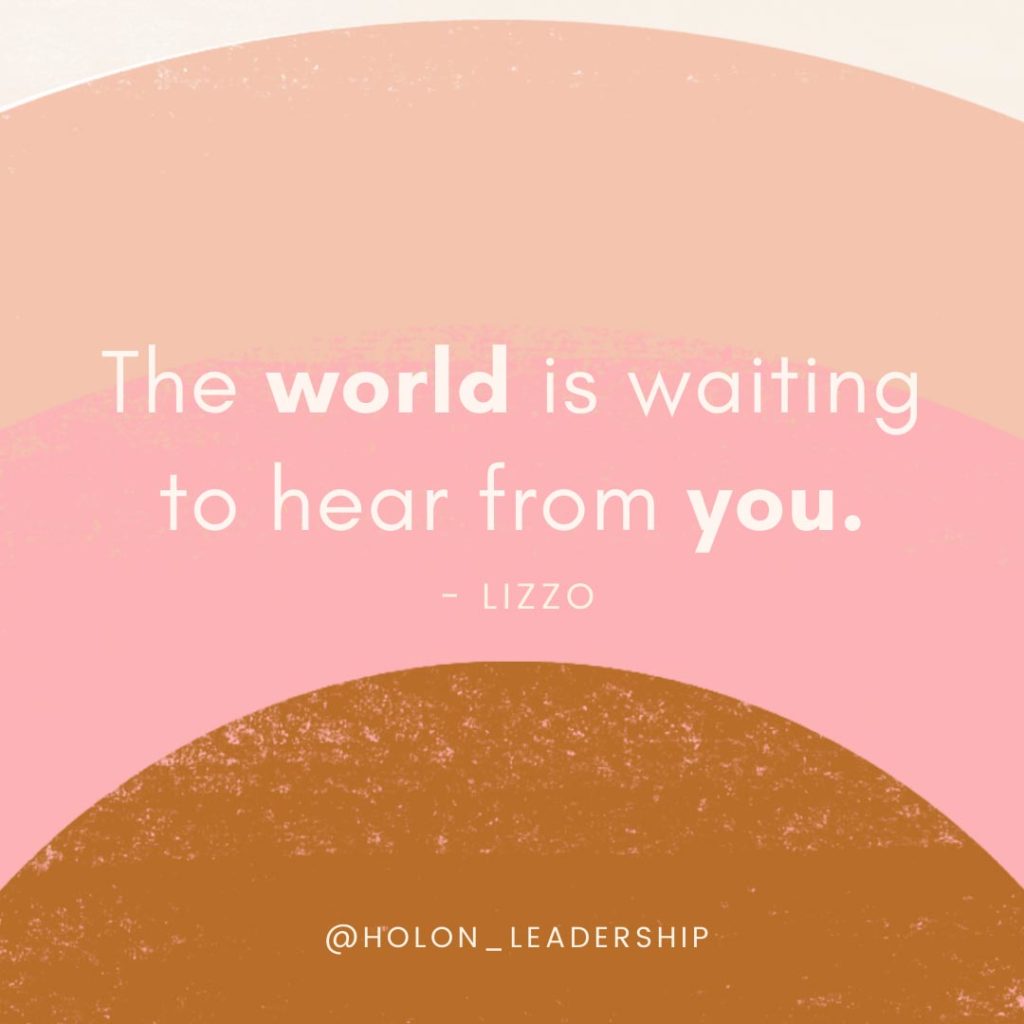In March I was watching Lizzo’s reality show. Lizzo’s a powerful, black, body positive, exhibitionist, business woman, singer, songwriter, rapper, she, she names a whole bunch of her own identities. And she has her reality show on Amazon Prime. And that’s not usually what I’m attracted to, but this is so positive for me. This show was so positive, big girls, if you’re looking for it. But when I listened to it, it struck a lot of chords for me on leadership practices and lessons that are really key for us as we rise in our full potential.
Right. And I wanted to share them here, because I think it’s, you know, it’s something you can go and watch. I totally binge watched it. But it’s not so much about her show. It’s about what was offered, through mainstream media, by the way. Which is so lovely to see, but what was offered in terms of constructs that I found serving and practices that I saw.
But I just wanted to underscore here. So one of the elements and this gets into a real good harsh one is around feedback and what it means to give and receive feedback. So with this show, it’s about uh, coming on to her dance team.
The way that they held it in the show was about holding feedback. Not you’re cut, or you’re an ass, or whatever it might be. It was about let’s hold feedback with three qualities, respect number one, number two, gratitude. Number three alignment. So what do I mean by that. Everything that was given back to the dancers, even when they were eliminated off the show, it all came from a place of respect.
You’re a dancer. I respect you here. You are showing up and being able to even say things along the lines, that they said, you know, were coming from places of love. And that, you know, well, we can’t take the risk with your situation and where we’re at right now. Can’t do that. I can’t ask you to come into this space because your ankle’s not ready.
You’re not ready for these reasons. And you know, it wouldn’t be respectful to you. It wouldn’t be respectful to the team you’re coming into. It’s not about you’re a bad person or not. It’s about respect. It just the way that they did it was beautiful. Uh, Tanisha Scott, um, I forget what episode it is, was just delivering some gorgeous feedback in this way to one of the dancers.
And it all came from a desire for you to be the best version of yourself. And when we’re working in teams, everybody, isn’t that the point isn’t part of the point when you come from a relational perspective of leadership to be able to create and see, and acknowledge the conditions and the desires for you to be the best version of yourself? And to be able to offer in multi directional forms and pathways of feedback of, you know, if you want to be here, here’s some things that I see you could work on.
Does that interest you? And this is the other part. I said the word alignment before. This isn’t your good, bad, you belong here, you don’t. It’s are we aligned right now? What this situation needs is a dancer that’s here, is a leader that’s here, and you’re not quite there yet. And you know what, let me give you some clear feedback from what I am seeing.
Take it and see, see how it does for you. Because we are in relationship, we’re going to talk to each other again and stuff. This moment just isn’t aligned for where we’re at, what we need and where you’re at. Alignment is huge. So when we’re giving and receiving feedback to come from places of respect and then also gratitude, I’m grateful for you for all you’re doing. And I am so excited for you to find places where you can rise to be your best self.
And even, you know, I’d like you to be here to do that. So come on in, but there’s stuff that we need to work on. And let’s see you in different situations. Anyways, I, you know, I could go on for a little too long about this, but it’s what does it mean to give feedback that’s not triggered? What does it mean to give feedback that comes from respect and gratitude and finding places of alignment? It just changes the narrative of not only how you give feedback, but how you receive it.
Okay. So another thing that I just took away in terms of leadership practices and from this Lizzo show is just, it’s the inner work that I see. It’s the personal accountability and self-awareness in, you can be a great employee. And if you come on into a team and you’ve got sourpuss kind of attitude all the time, of course, that’s just so obvious that, you know, that’s not what we want here. You know, some of that kind of stuff is obvious, but sometimes being able to fit into the culture requires us to tap into elements of ways that we protect ourselves.
That don’t allow us to maybe be self-aware of how we’re showing up, or be really confused about why am I not fitting in here? And when I really want to be, why, why are people making these weird stories up about me? The practice here that comes to me is what is your practice for reflecting on self? Advocating for yourself? Making choices, of course, of what works for me, what doesn’t of course. And, uh, how does this come into play when it just doesn’t feel right, but you really want it to, how do you step back? How do you personally step back, reflect?
What is your work? What is the work that you do for your own personal development to see how am I showing up here? Is it aligned with my intentions? What’s the feedback loops I’m kind of getting here directly, qualitatively, implicitly, what am I listening to? Am I listening? And then what is the inner work that I need to do in order for me to show up in the ways that I want to, or make the choice to leave if I want to? Or to just put up with some stuff, if that’s what I need.
The point here is around the inner work required for each of us as individuals to really work on our own self-respect, self-compassion, self-awareness, self accountability, and reliability to be, radically candor with our own selves, much less others, with our own selves to shine the lights into the shadows and the blind spots.
So we can make conscious decisions. So that we can create stories that are actually serving for ourselves. Okay. Feedback in our work. The other one, which ties into what I just said is around narratives and part of, I think why the show resonates for me is because of the narratives that are debunked in this show around body positivity, exercise, athleticism.
Who can do what and why? Who is held back from social constructs and why? And why is it such a big, a big deal? Uh, for some people to actually finally be seen, right? Like some of these things, seeing some of these things all come from societal narratives that we collectively and individually give power to.
And for me, you know, some of the things that came up is, you know, these women, as Lizzo says, you know, they’re athletes and they’re not working out to not be big. They’re working out to be strong. Exercise has nothing to do with how you look. Well, I don’t know about you, but that is not what I was taught when I was growing up.
But man, does that ever resonate for me now? That no matter how you look, how you be, what, however you define your identities, you’re worthy of being here just as you are, you’re worthy of going for your dreams. And it just makes me call into question what are the constructs that I give power to every day that actually don’t align with what I actually believe and what I put my intentions at, towards my behavior in too, right?
There’s something here about shining a light on our narratives, not just the inner work and the self-talk, but like, what are the narratives that show up in society? The social constructs that show up in society that were, that are just silent for us. And we just take for granted and they’re just there, or that we really struggle with, or that actually are at a head to head with how our behaviors actually show up. Are we looking at some of the narratives and re-juggling that and doing the hard work to make different choices.
So one of the narratives that came up is that we can’t be perfect, right. That we’re striving to be perfect. And I want to be here and I want to do this and blah, blah, blah, blah, blah, and yet being perfect. Oh my gosh. The weight of the world on your shoulders with perfectionism, it’s just, it’s too much responsibility and it gets suffocating and it’s a hustle in my experience.
It’s a hustle that doesn’t create sustained outcomes, right. That provides a really great, uh, shield to hide behind because usually with perfectionism, you’re being really productive. You’re chasing outputs. You seem right. All of these things that s ocietal constructs and narratives give awards to, rewards to, oh my gosh.
Like, yeah. When you, you pulled that off in that time, I couldn’t believe it. Good for you. Well, what you didn’t see is the late nights, the self beating up and now the insomnia that’s going to happen the next few days. And I’m not going to tell you that because let’s just say I’m perfect, right? Like, okay. It just doesn’t… the productivity and the perfectionism, like these narratives and rewards and power that comes with some of these narratives.
It just isn’t really working for you. Is it really working for you? So narratives. Do you have the ability to redefine some of these narratives? Redefine what productivity means? Redefine what perfect means?
Okay. Last one. Identity. Part of the work in leadership in our agency on our travels is to tap into our identities.
And some of those identities are really easy. It’s really easy for me to tap into mom, really easy for me to tap into woman, really easy for me to tap into Canadian. And some of those identities other people have as well, but it’s not easy for them to tap into. We all have different comfort levels and practices to tap into our identities.
One identity for me is being an athlete. Oh God. Even just saying that and sharing with that, that with you all is hard. You know, there’s, as soon as I say it, there’s a whole bunch of narratives in my head that are just trying to keep me safe. Cause that’s their job in my head is just stay safe, stay safe.
And uh, they just do this pile on, around, hold on a minute, don’t claim that because you don’t look like this, you don’t sound like this, you don’t act like this, you can’t do this and you can’t do that. You don’t have the right to claim this identity. You don’t you, and if you do, you’re going to go into this whole other arena and that’s too scary and so on and so on.
I don’t want to get too power to those voices. So I’ll just say so on and so on. Versus standing in my identity of being a powerful, gorgeous athletic woman. That identity is hard for me. It is a continued practice for me to hold and I jump on that Peloton, not in order to shift numbers on a scale. But because that movement is medicine for me, that sweat, which combines with tears a lot of times helps me move through some of the places that get me stuck. Some of the issues that consume me. And part of what helps is starting to claim identities that do serve me, that other people may not agree with.
And that’s too effin bad. It’s not your job to put identities on me. It’s mine. I get to choose. And so when I choose that I am an athlete with clear identity statements, and I can find places that celebrate those identity statements. Whew. Do I ever just like, let me just sit in that for a minute, like I’m just sitting in that.
Okay. When we come into places where we’re giving respectful feedback, that helps us align from places of gratitude, we do our own inner work, we give power to the narratives that serve us, and we start to own the identities that serve us. That agency in the world all, that’s for me the best bet at being able to tackle some of the complexity that we see today.
From this show that I’ve referenced, Lizzo says at some point in it, and I’ll share it with, with you as a, as an ending quote. That as she shares her platform and she starts to see the story of others, as I see the story in so many, the quote is that the world is waiting to hear from you. Thank you all. Stay in the practice.



 Apple Podcasts
Apple Podcasts Spotify
Spotify Google Podcasts
Google Podcasts